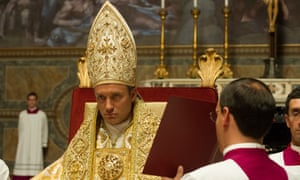Jude Law is excellent as Pius XIII, oscillating between vindictive authoritarian and wounded man-child with surprising charm. A TV review by REBECCA NICHOLSON, The Guardian, December 16, 2016
What a gorgeous and gripping series The Young Pope (Sky Atlantic H) has been. It is not surprising, coming from the director of such visually arresting films as Youth and The Great Beauty, but Oscar-winner Paolo Sorrentino’s first adventure on the small screen has been far more than just a pretty picture. It could have been overwhelmed by its splashy premise: Jude Law is Lenny Belardo, now Pius XIII, an ultra-conservative, manipulative new American pontiff. He has serious doubts about whether he believes in God, drinks Cherry Coke Zero for breakfast and smokes more than the cast of Mad Men combined. But The Young Pope was stunning, thoughtful and dreamlike, and even though key players have been strategically shifted to dioceses around the globe, its well-earned second series can’t come soon enough.
Lenny, or Pius to his Vatican pals, has spent much of the first season establishing just what kind of Holy Father he intends to be. He was anointed on the misguided promise that he would be a pliable looker who might boost the church’s coffers by allowing his handsome image to appear on a few plates in the gift shop. But Lenny is no patsy; his idea of reforming Catholicism has been to crack down on moral transgressions and to channel Daft Punk, Banksy and JD Salinger – his own points of reference – by hiding his face from public view, so that everyone can get back to the business of learning how to be Godly again. It is as effective a marketing technique as it is a point of principle.
There was a thriller-like tautness to Gutiérrez’s eventual capture of brazen paedophile Archbishop Kurtwell – and how wonderful that The Young Pope did not shy away from covering child abuse in the church – in New York. Kurtwell tried to destroy Pius’s reputation by releasing his old love letters to the press, but their publication in the New Yorker served to boost his popularity by showing his human side, even if it was against a backdrop of global protests over his stance on abortion. (The image of the naked women, each daubed in blood with a letter from the word BASTARD, is one of many unforgettable scenes, dropped in confidently and casually.) But, eventually, Kurtwell was reeled in and banished to Alaska – a poetic fall from grace for a man once so powerful, if not perhaps the most effective punishment for a habitual paedophile.
Sorrentino has said that it is no coincidence that Pius begins as an ultra-hardline pope in an era where the real pontiff is pursuing a more liberal papacy than his predecessors. What has been fascinating about this series is how well it has demonstrated the subtleties of change and growth. Early on, Pius boots out a cardinal for admitting his homosexuality, and insists it is incompatible with the teachings of the church. But, by the season finale, his greatest ally is Gutiérrez (Javier Cámara, conveying both compassion and pain with just a flicker of his eyes), who tells him his alignment of paedophilia and homosexuality is wrong. Pius admits he may be revising his views. Besides, he has a lot of mummy (and daddy) issues to deal with before he gets on to working out whether he believes in God.
Law has been excellent as Pius, oscillating between vindictive authoritarian and wounded man-child with surprising charm. And so, after his substitute parents leave him – James Cromwell’s Spencer finally dies, and he sends Diane Keaton’s Sister Mary off to work with children in Africa – we end with a road trip to Venice, where Pius hopes he might find those hippy parents who abandoned him and don’t seem to be particularly interested that their son is now the global head of the Catholic church.
In St Mark’s Square, he finally reveals his identity to the assembled crowd. Imagine wondering what the Pope looked like for months, and then finding out he has the face of Law. Sorrentino goes all out for the final scenes, which are as intricate as the Pope’s finest robes. Pius delivers a barnstorming address, then looks at the smiling faces in the crowd through a telescope Gutiérrez picked up at the service station on the way. He sees his parents, older, disappointed, leaving. I was left unsure if it was real or a vision; there is something Sopranos-like in The Young Pope’s ease with a dream sequence. As Pius collapses, we pull back to a wide shot, of the crowd, then of the city, then of the world. It’s so assured, so sumptuous, so well done, that it can absolutely get away with a gesture as grand as this.



